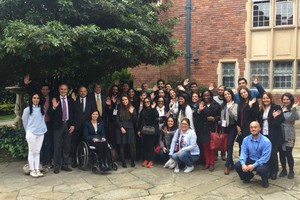 Participants at the Teaching Peace, Social Innovation, and Business Ethics in Post-Accord Colombia Institute. Photo credit: CESA.
Participants at the Teaching Peace, Social Innovation, and Business Ethics in Post-Accord Colombia Institute. Photo credit: CESA.
For five days in June, over 50 attendees representing the academy, nongovernmental organizations (NGO’s), and the government gathered to discuss the intersections among peace studies, business ethics and social entrepreneurship and innovation at the Teaching Peace, Social Innovation, and Business Ethics in Post-Accord Colombia institute. The June 18-22 event in Bogotá, Colombia, was co-sponsored by the University of Notre Dame’s Kroc Institute for International Peace Studies and the Colegio de Estudios Superiores en de Administración (CESA) with support from the United States Embassy.
The curriculum for the Institute was adapted from Kroc’s annual Summer Institute for Faculty. Program planners also drew on CESA’s knowledge of strategies for social innovation, leadership, and business ethics to build a robust program. Kroc faculty members John Paul Lederach, professor emeritus of international peacebuilding, George A. Lopez, Rev. Theodore M. Hesburgh, C.S.C., professor emeritus of peace studies, and Gerard F. Powers, director of the Catholic Peacebuilding Studies program and Coordinator of the Catholic Peacebuilding Network, provided input throughout the week. In addition, current doctoral student Angela Lederach, peace studies and anthropology, alumni Maria Lucia Zapata (M.A. ‘07), now director of Javeriana University’s master’s program in peace studies and conflict resolution, and Natalia Tejada (M.A. ‘14) also spoke and convened discussions. Doctoral student Ana Sanchez-Ramirez, history and peace studies, also provided logistical support at the event.
“The connection between business and peace studies during this program was most interesting,” said Powers. “There’s growing interest in corporate social responsibility and business ethics, and business leaders were particularly interested in how they can connect these concepts to peacebuilding.”
CESA staff see events like this summer program as integral to laying the groundwork for sustainable and peaceful development in Colombia, which will be integral to the successful implementation of the country’s 2016 peace agreement.
“After the signing of the peace agreement, we are aware that a huge and challenging task of peacebuilding lies ahead and that vulnerabilities exist for the
 Professor George Lopez speaks to participants via video conference. Photo credit: CESA
Professor George Lopez speaks to participants via video conference. Photo credit: CESA
country…” said Eden Bolivar, CESA director of international relations who led the planning process for the institute. “Addressing poverty and inequality, prioritizing investments in human capital formation, promoting ethical business practices, and laying the groundwork to promote sustainable development in Colombia are key to the peacebuilding process. We are convinced that higher education institutions have a key role to play in this peacebuilding process.”
For Angela Lederach, one highlight of the event was a dialogue facilitated by Beatríz Mendez Piñeros and Soraida (Soris) Muñoz, two members of Mothers of the False Positives of Bogotá and Soacha (MAFAPO), an organization comprised of mothers whose children were victims of state-sponsored violence during the armed conflict in Colombia. The two women not only shared stories from their advocacy work, but also shared their experiences with academic institutions and called on researchers and higher education leaders to engage them in more robust partnerships that give visibility to their work for justice and their expertise.
“These critical reflections are fundamental for peace studies programs that seek to engage in community-based work,” said Angela Lederach. “[It is important] to do so ethically and in a way that contributes, rather than disrupts, ongoing community peacebuilding processes. The session was powerful because Soris and Beatríz reminded us why we were all gathered together.”
This institute built on long-term collaboration between the Kroc Institute and Colombian leaders, civil society organizations, and educational institutions.
“This event bolstered our institutional connections to universities in the region, which will continue to expand in the coming years,” said Lopez. “We were inspired by the vibrancy that faculty, NGO’s and others brought to the conference and are looking forward to ongoing collaboration.”
Kroc’s past engagements in the region include partnerships with Colombian universities to launch peace studies programs and educational initiatives, as well as accompanying Colombian leaders advocating for peace. John Paul Lederach was instrumental in building connections across sectors in Colombia and providing support to Colombian leaders as they worked to negotiate peace in the midst of conflict. Lederach and Zapata’s work in La India and Bogotá, Colombia, was featured in a 2007 Notre Dame “What Would You Fight For?” video.
There is also a history of students from Colombia pursuing a master’s in international peace studies at Kroc, and Kroc master’s students from around the world have also completed field placements with organizations throughout the country. Since 2002, the Catholic Peacebuilding Network has also been working with Catholic bishops in the country and is also networking with peace studies programs in Colombia through the International Federation of Catholic Universities.
Most recently, the 2016 Colombian peace agreement gave the Kroc Institute primary responsibility for technical verification and monitoring of implementation of the accord through the Peace Accords Matrix (PAM) Barometer Initiative. The PAM team will release their second report on the status of peace accord implementation in August 2018.
Bolivar hopes that this summer program will be the first of many similar programs exploring the intersections of strategic peacebuilding and social entrepreneurship.
About the Kroc Institute for International Peace Studies
The University of Notre Dame's Kroc Institute for International Peace Studies, part of the Keough School of Global Affairs, is one of the world's leading centers for the study of the causes of violent conflict and strategies for sustainable peace. One of its main projects is the Peace Accords Matrix, which constitutes the largest and most comprehensive database about the implementation of 34 international peace agreements negotiated since 1989.
Contact:
George A. Lopez, lopez.1@nd.edu
Gerard F. Powers, Gerard.F.Powers.51@nd.edu
Hannah Heinzekehr, Communications Program Director, hheinz@nd.edu